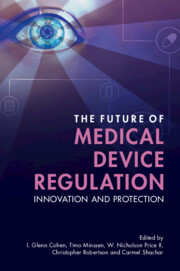The Future of Medical Device Regulation
Regulators have been more permissive for medical devices compared to their drug and biologic counterparts. While innovative products can thereby reach consumers more quickly, this approach raises serious public health and safety concerns. Additionally, the nature of medical devices is rapidly changing, as software has become as important as hardware. Regulation must keep pace with the current developments and controversies of this technology. This volume provides a multidisciplinary evaluation of the ethical, legal, and regulatory concerns surrounding medical devices in the United States and European Union. For medical providers, policymakers, and other stakeholders, the book offers a framework for the opportunities and challenges on the horizon for medical device regulation. Readers will gain a nuanced overview of the latest developments in patient privacy and safety, innovation, and new regulatory laws. This book is also available as Open Access on Cambridge Core.
I. Glenn Cohen is James A. Attwood and Leslie Williams Professor of Law, Deputy Dean, and Faculty Director at the Petrie-Flom Center for Health Law Policy, Biotechnology, and Bioethics at Harvard Law School.
Timo Minssen is Professor of Law and Director of the Center for Advanced Studies in Biomedical Innovation Law (CeBIL) at the Faculty of Law, University of Copenhagen, Denmark.
W. Nicholson Price II is Professor of Law at the University of Michigan School of Law.
Christopher Robertson is Professor and N. Neal Pike Scholar in Health & Disability Law at the School of Law, Boston University.
Carmel Shachar is Executive Director of the Petrie-Flom Center for Health Law Policy, Biotechnology, and Bioethics at Harvard Law School.

